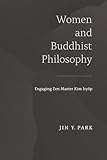Women and Buddhist Philosophy : Engaging Zen Master Kim Iryŏp / Jin Y. Park.
Material type: TextPublisher: Honolulu : University of Hawaii Press, [2017]Copyright date: ©2017Description: 1 online resource (296 p.)Content type:
TextPublisher: Honolulu : University of Hawaii Press, [2017]Copyright date: ©2017Description: 1 online resource (296 p.)Content type: - 9780824858780
- 9780824858810
- Buddhist nuns -- Korea -- Biography
- Women in Buddhism
- Women -- Religious aspects -- Buddhism
- Zen Buddhism -- Philosophy
- Zen Buddhists -- Korea -- Biography
- RELIGION / Buddhism / Zen (see also PHILOSOPHY / Zen)
- Buddhist philosophy
- Kim Iryop
- Korea
- Korean Buddhism
- New Women
- Zen Buddhism
- feminism
- identity
- modern Buddhism
- narrative
- no-self
- suffering
- 294.3/927092 B 23
- online - DeGruyter
- Issued also in print.
| Item type | Current library | Call number | URL | Status | Notes | Barcode | |
|---|---|---|---|---|---|---|---|
 eBook
eBook
|
Biblioteca "Angelicum" Pont. Univ. S.Tommaso d'Aquino Nuvola online | online - DeGruyter (Browse shelf(Opens below)) | Online access | Not for loan (Accesso limitato) | Accesso per gli utenti autorizzati / Access for authorized users | (dgr)9780824858810 |
Browsing Biblioteca "Angelicum" Pont. Univ. S.Tommaso d'Aquino shelves, Shelving location: Nuvola online Close shelf browser (Hides shelf browser)

|

|

|

|

|

|

|
||
| online - DeGruyter Darwin, Dharma, and the Divine : Evolutionary Theory and Religion in Modern Japan / | online - DeGruyter Teika : The Life and Works of a Medieval Japanese Poet / | online - DeGruyter Facing the Spears of Change : The Life and Legacy of John Papa `Ī`ī / | online - DeGruyter Women and Buddhist Philosophy : Engaging Zen Master Kim Iryŏp / | online - DeGruyter For a Song / | online - DeGruyter In Pursuit of Progress : Narratives of Development on a Philippine Island / | online - DeGruyter Tracing the Itinerant Path : Jishū Nuns of Medieval Japan / |
Frontmatter -- Contents -- Acknowledgments -- Introduction -- Part One -- Chapter One. Between Light and Darkness (1896-1920) -- Chapter Two. To See and Be Seen (1918-1927) -- Chapter Three. Sense and Nonsense of Revolt (1924-1927) -- Part Two -- Chapter Four. I Who Have Lost Me (1927-1935) -- Chapter Five. Time for Reconciliation: Reflections of a Zen Buddhist Nun (1955-1960) -- Chapter Six. At the End of the Journey: In Between Happiness and Misfortune (1960-1971) -- Chapter Seven. A Life Lived: Women and Buddhist Philosophy -- Abbreviations -- Notes -- Bibliography -- Index -- About the Author
restricted access online access with authorization star
http://purl.org/coar/access_right/c_16ec
Why and how do women engage with Buddhism and philosophy? The present volume aims to answer these questions by examining the life and philosophy of a Korean Zen Buddhist nun, Kim Iryŏp (1896-1971). The daughter of a pastor, Iryŏp began questioning Christian doctrine as a teenager. In a few years, she became increasingly involved in women's movements in Korea, speaking against society's control of female sexuality and demanding sexual freedom and free divorce for women. While in her late twenties, an existential turn in her thinking led Iryŏp to Buddhism; she eventually joined a monastery and went on to become a leading figure in the female monastic community until her death.After taking the tonsure, Iryŏp followed the advice of her teacher and stopped publishing for more than two decades. She returned to the world of letters in her sixties, using her strong, distinctive voice to address fundamental questions on the scope of identity, the meaning of being human, and the value of existence. In her writing, she frequently adopted an autobiographical style that combined her experiences with Buddhist teachings. Through a close analysis of Iryŏp's story, Buddhist philosophy and practice in connection with East Asian new women's movements, and continental philosophy, this volume offers a creative interpretation of Buddhism as both a philosophy and a religion actively engaged with lives as they are lived. It presents a fascinating narrative on how women connect with the world-whether through social issues such as gender inequality, a Buddhist worldview, or existential debates on human existence and provides readers with a new way of philosophizing that is transformative and deeply connected with everyday life. Women and Buddhist Philosophy: Engaging Zen Master Kim Iryŏp will be of primary interest to scholars and students of Buddhism, Buddhist and comparative philosophy, and gender and Korean studies.
Issued also in print.
Mode of access: Internet via World Wide Web.
In English.
Description based on online resource; title from PDF title page (publisher's Web site, viewed 02. Mrz 2022)


